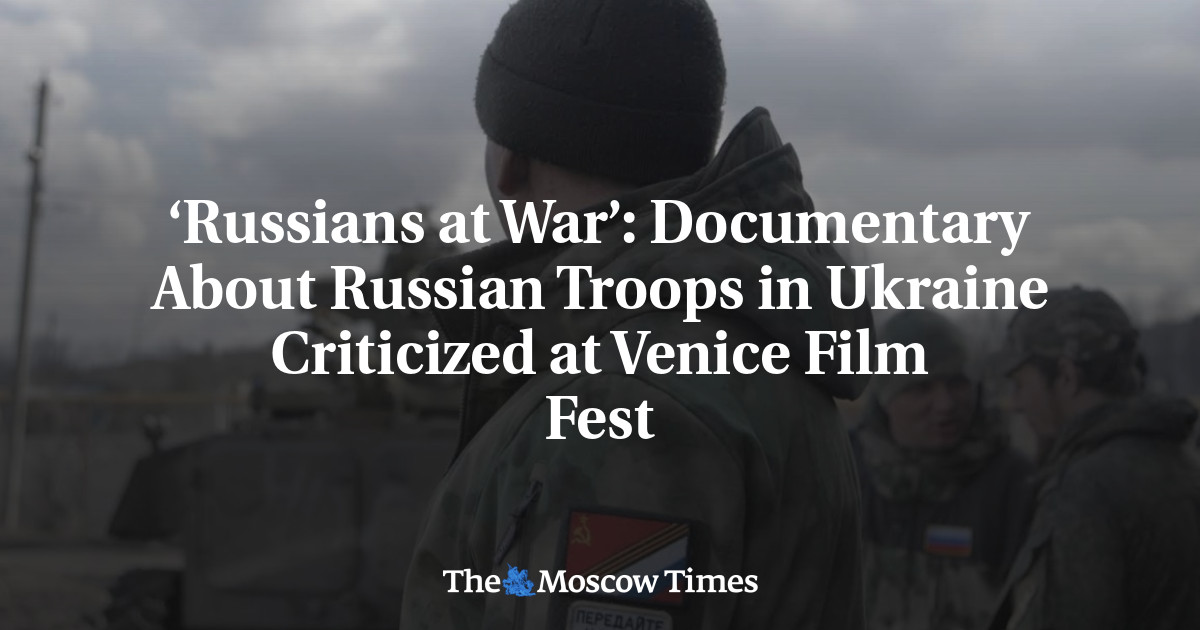
“All this must be filmed,” director Anastasia Trofimova said to explain why she began filming “Russians at War.”
The documentary was presented in the category of “Out of Competition” at the 81st Venice Film Festival. Trofimova, who studied in Canada, had previously worked with RT (formerly Russia Today) and then with the French service of Canadian Broadcasting Corporation in Moscow.
Trofimova said she wanted to make a documentary and always wanted to talk to the Russian soldiers, but the opportunity only arose when she met Ilya, a Ukrainian citizen who had moved to Moscow with his family.
When they met, Ilya was playing Grandfather Frost for children on New Year’s Eve 2022. Later Trofimova discovered he was a soldier fighting on the side of Russia. When he heard that she wanted to make a film and called her from the front, she begged to join his battalion.
She maintains that she went to the front without authorization or press accreditation, embedding herself with a Russian battalion in eastern Ukraine.
Trofimova takes the audience from 180 km behind the front lines where ranks are “replenished” to the trenches of the front line where the men die. The soldiers depicted are often volunteers who say they went to the front for various personal reasons: vague patriotism, avenging fallen friends, protecting loved ones, preventing their children from going to war in the future, or, more commonly, for money.
However, financial compensation is not guaranteed. Soldiers sometimes find themselves stuck at the front without contracts, status or pay. In the film, one soldier says that his contract expired months ago, but he was ordered to stay at the front without payment and without compensation for being wounded.
Trofimova was accepted into the soldiers’ ranks, seen as someone who could “tell the truth” that has been silenced by what the men saw as both Russian and Western propaganda.
While “Russians at War” gives portraits of the Russian soldiers, it shows only brief glimpses of fighting. There is no sense of the destruction or atrocities committed by Russian forces in Ukraine. One soldier dismisses accusations of war crimes committed by Russian troops as “impossible.”
Trofimova stated that she saw no signs of war crimes during her time near the front. “I think in Western media, that’s what Russian soldiers are associated with at this point, because there were no other stories,” she said.
International organization such as Amnesty International and the United Nations Human Rights watch have abundant reports of war crimes and violations.
Particularly surprising in the film is the soldiers’ total lack of awareness, united by their inability to make sense of what is happening around them. They wonder what posterity will think of this madness, unable to answer because “starting a war is easy, but ending it…” This is especially true when the only way to go home is “feet first” — lying on a stretcher or in a coffin. In the second part of the film, codes 300 and 200, referring to wounded and dead soldiers respectively, become central. “There was an order. We went in,” another soldier bluntly puts it.
The film is, to no one’s surprise, controversial. In Venice the producers faced strong criticism from the audience for their decision to support the production. Philippe Levasseur of Capa Presse noted, in part, that another project he produced — a documentary called “Viktor” about a deaf photographer embedded in the Ukrainian army — would be shown along with “Russians at War” at the Toronto International Film Festival (TIFF) next week. Another producer, Cornelia Principe said that while the film does not discuss war crimes, it doesn’t mean they are not happening.
Trofimova defended her choices. “In Russia, they are these heroes who never die. In the West, they are mostly war criminals,” comments Trofimova. “To me, the biggest shock was to see how ordinary they were.”





